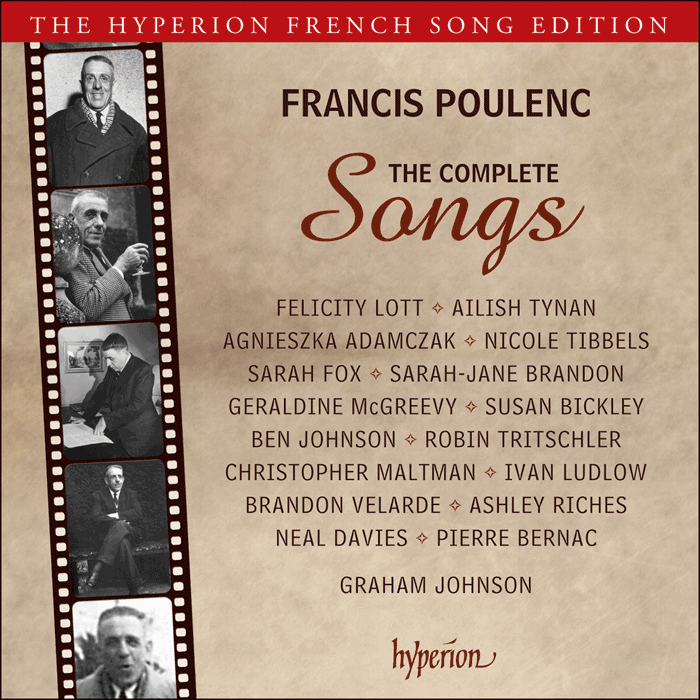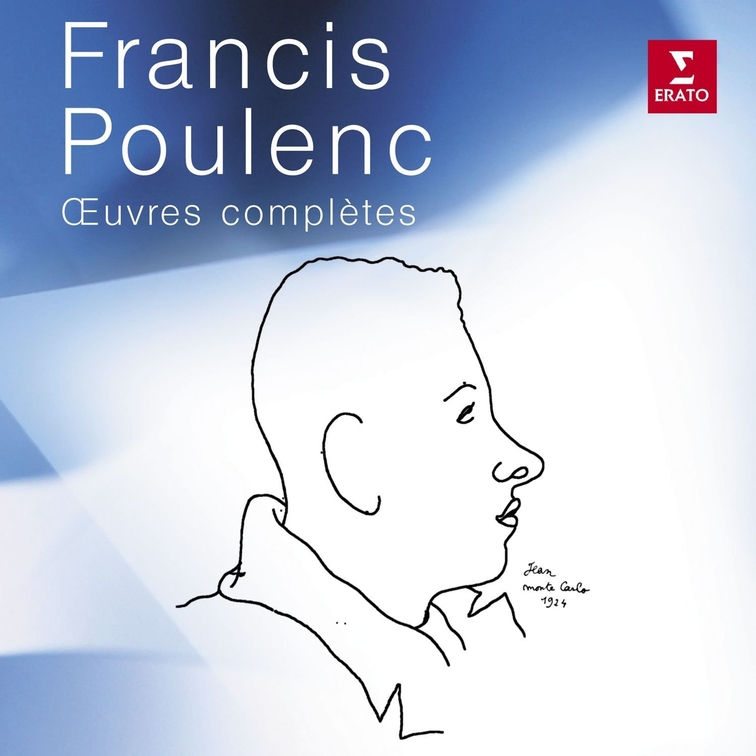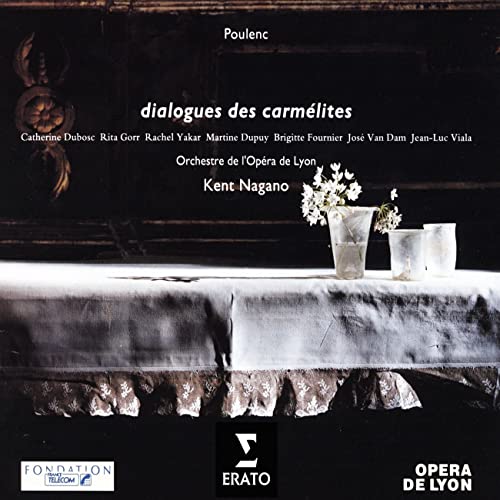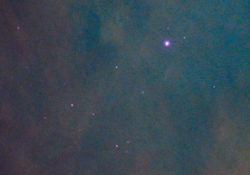Book Discussion with Listening Examples
The Hampsong Foundation is proud to present an exclusively recorded illustrated discussion by the acclaimed great song accompanist and scholar Graham Johnson of the mélodies of Francis Poulenc, etched in the context of the composer’s life, and appearing here now so as to coincide with the launch of Graham Johnson’s seminal biography POULENC: THE LIFE IN THE SONGS. This book, published by Liveright / Norton in June 2020, not only serves as the definitive guide to Poulenc’s mélodies, it also reveals in historical and psychological depth the profound emotional struggles that lay behind the composer’s songs and how these inspired creations take us to the centre of his artistic soul.
Graham Johnson includes in his wide ranging recorded discussion here, which is illustrated with many music extracts, recollections of Poulenc that he heard in person from a vital figure in the composer’s life: the extolled great baritone and pedagogue Pierre Bernac, the central artistic collaborator and close friend of Poulenc for more than three decades. Graham Johnson not only personally knew Pierre Bernac, he also worked with him, and one of the music extracts in the feature is taken from the recording issued by Hyperion Records in which he was the pianist when Pierre Bernac narrated the spoken text of Poulenc’s L’Histoire de Babar le petit éléphant.This is included in the celebrated Hyperion French Song Edition of the complete mélodies of Poulenc, which was masterminded by Graham Johnson who performs the piano accompaniments in all the items. Nearly all the music illustrations of mélodies in this feature are extracted from the Hyperion complete Poulenc mélodies set, details of which follow below, and The Hampsong Foundation is extremely grateful to Hyperion Records for granting permission for their inclusion during Graham Johnson’s discussion. Virtually all the other music illustrations, consisting of choral, ballet, piano, chamber and concerto items as well as Francis Poulenc accompanying Pierre Bernac in one of the composer’s mélodies, are extracted from Warner Classics’ edition of the complete works of Poulenc, details of which follow below, and The Hampsong Foundation is extremely grateful to Warner Classics for granting permission for their inclusion during the discussion. The Foundation is also extremely grateful to Warner Classics for granting permission to include an extract from another recording of the opera Dialogues des Carmélites that is in their catalogue.
Owing to the disallowing of travel during the COVID-19 virus crisis at the time of making this feature, it was not possible for the producer to record Graham Johnson’s discussion in person in studio conditions, and instead Mr. Johnson recorded his voice at his home on an iPhone and sent it on for the production. Whereas the sound quality is good, both Mr. Johnson and the producer are aware that it is not as refined and acoustically natural in tone as it would have been in normal circumstances, and the listener’s awareness of this is requested.
Graham Johnson has generously provided a glossary of names that he mentions in his discussion, so that the listener can also refer to them in textual form. These also follow below.
Jon Tolansky, Feature Producer – May 2020
File Download
SAMPLE: Poulenc: The Life in the Songs
Poulenc The Life in the Songs Sample (pdf / 1.42 MB)POULENC: THE LIFE IN THE SONGS
One of the greatest modernist composers comes alive in this illuminating biography, a must-have for musicians and music-lovers alike.
Francis Poulenc (1899–1963) is widely acknowledged as one of the twentieth century’s most significant masters of vocal music —solo, choral, and operatic— quite apart from his achievements in instrumental spheres. But what it cost him, and the determined bravery it took for his unusual talent to thrive, has always been underestimated. In this seminal biography, which will serve as the definitive guide to the songs, acclaimed collaborative pianist Graham Johnson shows that it is in Poulenc’s extraordinary songs, and seeing how they fit into his life —which included crippling guilt on account of his sexuality— that we discover Poulenc heart and soul. With Jeremy Sams’s vibrant new song translations, the first in over forty years, and the insight that comes from a lifetime of performing this music, Johnson provides an essential volume for singers, pianists, listeners, and readers interested in the artistic milieu of modernism in the first half of the twentieth century.
ISBN: 978-1-63149-523-6

MUSIC ILLUSTRATIONS
All the Hyperion recordings are extracted from the Hyperion complete mélodies of Poulenc edition, catalogue number CDA68021/4.
All the Warner Classics recordings except the excerpt from Dialogues des Carmélites are extracted from the Warner Classics complete Poulenc edition, catalogue number 9721652.
The excerpt from Dialogues des Carmélites is extracted from the additional Warner Classics recording of the opera, catalogue number 3586572.
Le bestiare: Le dromadaire – Brandon Velarde, Graham Johnson – Hyperion
Les biches: Ouverture – Philharmonia Orchestra, Georges Prêtre – Warner Classics
Promenades: À bicyclette – Gabriel Tacchino – Warner Classics
Trio for piano, oboe and bassoon: Andante – Jacques Février, Robert Casier, Gérard Faisandier – Warner Classics
Air chantés: Air champêtre – Alish Tynan, Graham Johnson – Hyperion
Chansons gaillardes: Ma maîtresse volage – Ashley Riches, Graham Johnson – Hyperion
Trois poèmes de Louise Lalanne: Hier – Alish Tynan, Graham Johnson – Hyperion
Quatre poèmes de Guillaume Apollinaire: 1904 – Ivan Ludlow, Graham Johnson – Hyperion
Tel jour telle nuit: Une ruine coquille vide – Pierre Bernac, Francis Poulenc – Warner Classics
Cinq poems de Max Jacob: Cimetière – Nicole Tibbels, Graham Johnson – Hyperion
Banalités: Chanson d’Orkenise – Ivan Ludlow, Graham Johnson – Hyperion
Les Animaux modèles: Le lion amoureux – Paris Conservatoire Orchestra, Georges Prêtre – Warner Classics
L’Histoire de Babar le petit éléphant: Babar à la forêt – Pierre Bernac, Graham Johnson – Hyperion
Chansons villageoises: Chansons du clair-tamis – Christopher Maltman, Graham Johnson – Hyperion
Figure humaine: Liberté – The Sixteen, Harry Christophers – Warner Classics
Concerto for Organ, Strings and Timpani: Andante – Maurice Duruflé, Orchestre National de la Radiodiffusion Française, Georges Prêtre – Warner Classics
Sécheresses: Le faux avenir – Choeurs de Radio France, Nouvel Orchestre Philharmonique de Radio France, Georges Prêtre – Warner Classics
Sonata for Two Pianos: Prologue – Jacques Février, Gabriel Tacchino – Warner Classics
Calligrammes: L’espionne – Christopher Maltman, Graham Johnson – Hyperion
Le travail du peintre: Paul Klee – Geraldine McGreevy, Graham Johnson – Hyperion
Dialogues des Carmélites: Act 1 Scene 3 – Rita Gorr, Martine Dupuy, Orchestre de l’Opéra National de Lyon, Kent Nagano – Warner Classics
Miroirs brûlants: Tu vois le feu du soir – Christopher Maltman, Graham Johnson – Hyperion
Banalités: Sanglots Ivan Ludlow, Graham Johnson – Hyperion
L’Histoire de Babar le petit éléphant: Babar à la forêt (opening) – Pierre Bernac, Graham Johnson – Hyperion
Poulenc: The Complete Songs
Release Date: Oct. 2013
Hyperion: CDA68021/4

Poulenc: Oeuvres complètes
Featuring the composer on the piano, numerous artists who have worked with Poulenc himself such as Pierre Bernac, Jacques Février, Gabriel Tacchino, Georges Prêtre and so many others, this set also presents the vivid tradition of the Poulenc interpretation, including the first ever recording of Un Joueur de flute berce les ruines, by Emmanuel Pahud.
Warner Classics: 9721652

Dialogues des Carmélites
José van Dam (Le Marquis de la Force), Catherine Dubosc (Blanche de la Force), Jean-Luc Viala (Le Chevalier de la Force), Rita Gorr (La Prieure du Carmel), Rachel Yakar (La Nouvelle Prieure), Martine Dupuy (Mere Marie), Brigitte Fournier (Constance), Michel Sénéchal (L'Aumonier), François Le Roux (Le Geolier)
Choeurs et orchestre de l'Opéra national de Lyon, Kent Nagano
Warner Classics / Erato: 3586572

GLOSSARY OF NAMES IN THE DISCUSSION, IN ORDER OF APPEARANCE
Elysée Palace [near Francis Poulenc’s birthplace]
Lycée Condorcet [Francis Poulenc’s school]
Maison Durand [music publisher’s showroom]
Marcel Royer (‘Papoum’) [Francis Poulenc’s uncle]
Maurice Chevalier, Mistinguett
Igor Stravinsky, Diaghilev (Serge), Picasso (Pablo)
Adrienne Monnier’s bookshop in the Rue de l’Odéon
Guillaume Apollinaire
Bestiare poems with illustrations by Raoul Dufy
Louis Aragon [poet initially irritated by Francis Poulenc]
Satie (Erik)
“avant la lettre”; “petit maître”
Cocteau (Jean)
Andre Manceaux [Francis Poulenc’s’s brother-in-law]
Les Six: Milhaud (Darius)’ Auric (Georges); Honegger (Arthur); Durey (Louis); Tailleferre (Germaine)
“Secret sorties”
Raymond Radiguet
Richard Chanlaire [Francis Poulenc’s’s first known lover]
Raymonde Linossier [to whom Francis Poulenc proposed marriage]
Chansons gaillardes
Marie Laurencin [mistress of Apollinaire]
Quatre Poèmes de Guillaume Apollinaire
Max Jacob
The surrealist poet Paul Éluard
Cinq Poèmes de Paul Éluard
Pierre Bernac
Tel jour telle nuit [song cycle]
The Interpretation of French Song by Pierre Bernac
Banalités [song cycle]
Les Animaux modèles [ballet]
L’Histoire de Babar le petit éléphant
Chansons villageoises [song cycle]
Figure humaine [unaccompanied choral cantata]
Maire-Ange Lebedeff [Francis Poulenc’s daughter]
Brigitte Manceaux [Francis Poulenc’s niece]
Rocamadour, the shrine of the Black Virgin in the Uzerche.
Vouvray from the “cave” of FP’s chateau in Noizay
Sécheresses [orchestrally accompanied choral cantata]
Marie Blanche de Polignac
Charles and Marie-Laure de Noailles
Raymond Destouches [Francis Poulenc’s long-term partner]
Denise Duval
Tu vois le feu du soir
Sanglots
Lucien Roubert
Louis Gautier
Produced by





